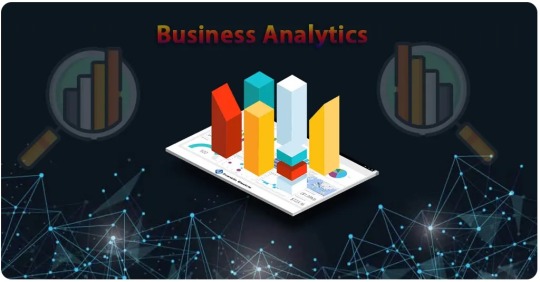#Business Data Analytics
Explore tagged Tumblr posts
Text
The mission of the Gordon Ford College of Business is to actively support and engage students, faculty, staff, and community in academic and lifelong professional development, providing the foundation needed to lead in today's diverse business environment.

#supply chain#Sales#Marketing#management#Human Resources#Financial Planning#finance#economics and business analytics#economics#data analytics#cybersecurity#business data analytics#actuarial sciences#Accounting#Business
3 notes
·
View notes
Text
Advanced Business Data Analytics Tools, Software, and Services
In today’s fast-paced digital economy, businesses generate massive volumes of data every second. To remain competitive, organizations must move beyond traditional reporting and embrace advanced business data analytics — unlocking actionable insights, improving decision-making, and driving innovation.
What is Business Data Analytics?
Business data analytics refers to the process of collecting, analyzing, and interpreting large sets of data to guide business strategy. It involves descriptive, diagnostic, predictive, and prescriptive techniques to turn raw data into value.
Key Benefits of Business Analytics Tools and Services
Informed Decision-Making Analytics enables executives to base decisions on real-time insights rather than intuition.
Operational Efficiency Identify bottlenecks, optimize workflows, and improve resource allocation.
Customer Understanding Analyze customer behavior and preferences to personalize experiences and increase satisfaction.
Market Trend Forecasting Predict emerging trends and stay ahead of competitors.
Risk Management Identify anomalies and forecast risks using predictive models and AI-driven algorithms.
Advanced Tools and Software for Business Analytics
Top analytics platforms offer a wide range of features, including:
Data Visualization Tools (e.g., Power BI, Tableau)
AI & Machine Learning Integration
Real-Time Dashboards
Predictive & Prescriptive Analytics Engines
Cloud-Based Data Warehousing Solutions
Comprehensive Analytics Services
Expert analytics service providers deliver:
Consulting and Strategy Planning
Custom Dashboard Development
Data Integration and Preparation
Managed Analytics Services
Training and Support
Why Choose PiLog for Business Data Analytics?
PiLog provides powerful, AI-enabled data analytics solutions tailored to enterprise needs. From real-time dashboards to advanced data modeling and reporting, PiLog empowers businesses to:
Accelerate decision-making
Uncover hidden opportunities
Drive digital transformation with confidence
#Business Data Analytics#Analytics Software#Data Visualization Tools#Predictive Analytics#Data Analytics Services
0 notes
Text
George Telegraph Training Institute offers a comprehensive Business Data Analytics Course. Earn a diploma in business analytics course in Kolkata, Visit us.
0 notes
Text
Unlocking Business Insights with IntelliData Labs: Your Trusted Data Analytics Company in the USA

Why Data Analytics Matters for Businesses
Data analytics plays a crucial role in helping businesses unlock hidden patterns, trends, and correlations within their data. By leveraging advanced analytics techniques and technologies, businesses can gain valuable insights into customer behaviour, market trends, operational efficiency, and more. Here are some key reasons why data analytics is essential for businesses:
1. Informed Decision-Making: Data analytics provides businesses with the insights they need to make informed, data-driven decisions. Whether it’s optimising marketing campaigns, improving product offerings, or identifying new revenue opportunities, data-driven decision-making enables businesses to stay agile and responsive in today’s fast-paced market environment.
2. Competitive Advantage: In a competitive marketplace, businesses that leverage data analytics have a distinct advantage over those that don’t. By uncovering insights that others may overlook, businesses can identify untapped market opportunities, anticipate customer needs, and outmanoeuvre competitors, ultimately gaining a competitive edge in their industry.
3. Operational Efficiency: Data analytics helps businesses streamline operations, reduce costs, and improve efficiency. By analysing operational data, businesses can identify bottlenecks, optimise processes, and allocate resources more effectively, leading to greater productivity and profitability.
4. Enhanced Customer Experiences: Understanding customer behaviour and preferences is key to delivering personalised and relevant experiences. Data analytics enables businesses to analyse customer data, segment audiences, and tailor products and services to meet individual needs, resulting in improved customer satisfaction and loyalty.

At IntelliData Labs, we specialise in helping businesses harness the power of data to drive growth and innovation. Our team of data scientists, analysts, and engineers possesses deep expertise in a wide range of data analytics disciplines, including descriptive analytics, predictive analytics, prescriptive analytics, and more. Here’s how we can help your organisation unlock its full potential through data analytics:
1. Data Strategy and Consulting: We work closely with businesses to develop tailored data strategies aligned with their unique goals and objectives. Whether you’re looking to enhance customer engagement, optimise operations, or drive innovation, our team can help you define a roadmap for success.
2. Data Visualisation and Reporting: We specialise in creating intuitive and interactive data visualisations and reports that enable businesses to explore and understand their data more effectively. From dashboards and scorecards to custom reports and infographics, we deliver insights in a format that’s easy to digest and act upon.
3. Predictive Modelling and Machine Learning: Leveraging advanced analytics techniques such as predictive modelling and machine learning, we help businesses forecast future trends, identify patterns, and make data-driven predictions. Whether you’re looking to optimise inventory management, mitigate risk, or personalise marketing efforts, our predictive analytics solutions can help you achieve your objectives.
4. Data Governance and Compliance: We assist businesses in establishing robust data governance frameworks and ensuring compliance with regulatory requirements such as GDPR, CCPA, and HIPAA. From data quality management to privacy and security controls, we help businesses mitigate risks and protect sensitive information.
In conclusion, Business Data Analytics is a powerful tool for businesses looking to gain a competitive edge, drive innovation, and achieve their strategic objectives. With IntelliData Labs as your trusted partner, you can unlock the full potential of your data and transform it into actionable insights that drive business success. Contact us today to learn more about our data analytics services and how we can help your organisation thrive in today’s data-driven world.
0 notes
Text
Business Analytics Services | Connect Infosoft | Data-Driven Solutions
Discover the transformative potential of your data with Connect Infosoft's Business Analytics services. Our expert team offers comprehensive solutions to unlock actionable insights and drive informed decision-making. From analytics consulting to advanced tools and visualization services, we empower businesses to harness the full power of their data. Partner with us for predictive analytics, data visualization, and business intelligence tools that pave the way for success.
For more info: Click Here

#Business analytics solutions#Data-driven insights#Analytics consulting services#Business intelligence tools#Advanced analytics services#Data visualization services#Predictive analytics solutions#Data analysis consulting#Business data analytics#Data-driven decision making
0 notes
Text

Guiding Growth: The Business Transformation Consultant in Action
Witness the expertise of a business transformation consultant as they navigate the complex terrain of organizational evolution. Through strategic vision and technological prowess, these professionals drive change, fostering innovation and ensuring businesses thrive in today's dynamic marketplace.
#tech consulting firms#technology consulting companies#business transformation consultant#business data analytics#digital business consulting#it transformation consultant
0 notes
Text
The Future of Business: How is Advanced Analytics Presenting Businesses with Next-Level Insights

Organizations are set to transform themselves into truly intelligent enterprises with the integration of advanced analytics and smart machines in the cognitive sense for data-driven decision-making.
0 notes
Text
New Business Marketing Tips And Tricks for Success
Starting a new business can be an exciting endeavor, but it also comes with its fair share of challenges, especially in the competitive landscape of today's market. Effective marketing is crucial for the success of any new venture. Here are four essential marketing tips and tricks to help your new business thrive.
Define Your Target Audience: Before diving into marketing efforts, it's essential to identify and understand your target audience. Define your ideal customer persona by considering demographics, interests, pain points, and buying behaviors. Conduct market research to gather valuable insights that will guide your marketing strategies. Tailoring your messages and campaigns to resonate with your target audience will significantly increase your chances of success.
Once you have a clear picture of your audience, choose the most suitable marketing channels to reach them effectively. Social media, email marketing, content marketing, and pay-per-click advertising are just a few options to consider. Your choice of channels should align with where your audience spends their time online.

Create Compelling Content: Content marketing is a powerful tool for new businesses to establish their brand and build credibility. Develop high-quality, informative, and engaging content that addresses the needs and interests of your target audience. This content can take various forms, including blog posts, videos, infographics, and podcasts.
Consistency is key when it comes to content creation. Develop a content calendar to plan and schedule regular updates. Providing valuable content not only helps you connect with your audience but also boosts your search engine rankings, making it easier for potential customers to find you.

Leverage Social Media: Social media platforms have become indispensable for marketing in today's digital age. Create profiles on relevant social media platforms and engage with your audience regularly. Share your content, interact with followers, and participate in industry-related discussions.
Paid advertising on social media can also be a cost-effective way to reach a broader audience. Platforms like Facebook, Instagram, and LinkedIn offer targeting options that allow you to reach users who match your ideal customer profile.

Monitor and Adapt: Marketing is an ever-evolving field, and what works today may not work tomorrow. To stay ahead of the curve, regularly monitor the performance of your marketing efforts. Analyze key metrics such as website traffic, conversion rates, and return on investment (ROI). Use tools like Google Analytics and social media insights to gather data and insights.
Based on your findings, be prepared to adapt your strategies and tactics. If a particular marketing channel isn't delivering the expected results, reallocate your resources to more promising avenues. Stay up-to-date with industry trends and keep an eye on your competitors to ensure your marketing efforts remain relevant and competitive.
In conclusion, effective marketing is essential for the success of any new business. By defining your target audience, creating compelling content, leveraging social media, and continuously monitoring and adapting your strategies, you can position your new business for growth and long-term success in a competitive market. Remember that success may not come overnight, but with persistence and the right marketing approach, your new business can thrive.

#business#digitalbusiness#digitalmarketing#seo#market analysis#data analytics#marketing#management#sales#learn digital marketing#Digital marketing course#seo expert#business success#businessgrowth
88 notes
·
View notes
Text

AI’s Role in Business Process Automation
Automation has come a long way from simply replacing manual tasks with machines. With AI stepping into the scene, business process automation is no longer just about cutting costs or speeding up workflows—it’s about making smarter, more adaptive decisions that continuously evolve. AI isn't just doing what we tell it; it’s learning, predicting, and innovating in ways that redefine how businesses operate.
From hyperautomation to AI-powered chatbots and intelligent document processing, the world of automation is rapidly expanding. But what does the future hold?
What is Business Process Automation?
Business Process Automation (BPA) refers to the use of technology to streamline and automate repetitive, rule-based tasks within an organization. The goal is to improve efficiency, reduce errors, cut costs, and free up human workers for higher-value activities. BPA covers a wide range of functions, from automating simple data entry tasks to orchestrating complex workflows across multiple departments.
Traditional BPA solutions rely on predefined rules and scripts to automate tasks such as invoicing, payroll processing, customer service inquiries, and supply chain management. However, as businesses deal with increasing amounts of data and more complex decision-making requirements, AI is playing an increasingly critical role in enhancing BPA capabilities.
AI’s Role in Business Process Automation
AI is revolutionizing business process automation by introducing cognitive capabilities that allow systems to learn, adapt, and make intelligent decisions. Unlike traditional automation, which follows a strict set of rules, AI-driven BPA leverages machine learning, natural language processing (NLP), and computer vision to understand patterns, process unstructured data, and provide predictive insights.
Here are some of the key ways AI is enhancing BPA:
Self-Learning Systems: AI-powered BPA can analyze past workflows and optimize them dynamically without human intervention.
Advanced Data Processing: AI-driven tools can extract information from documents, emails, and customer interactions, enabling businesses to process data faster and more accurately.
Predictive Analytics: AI helps businesses forecast trends, detect anomalies, and make proactive decisions based on real-time insights.
Enhanced Customer Interactions: AI-powered chatbots and virtual assistants provide 24/7 support, improving customer service efficiency and satisfaction.
Automation of Complex Workflows: AI enables the automation of multi-step, decision-heavy processes, such as fraud detection, regulatory compliance, and personalized marketing campaigns.
As organizations seek more efficient ways to handle increasing data volumes and complex processes, AI-driven BPA is becoming a strategic priority. The ability of AI to analyze patterns, predict outcomes, and make intelligent decisions is transforming industries such as finance, healthcare, retail, and manufacturing.
“At the leading edge of automation, AI transforms routine workflows into smart, adaptive systems that think ahead. It’s not about merely accelerating tasks—it’s about creating an evolving framework that continuously optimizes operations for future challenges.”
— Emma Reynolds, CTO of QuantumOps
Trends in AI-Driven Business Process Automation
1. Hyperautomation
Hyperautomation, a term coined by Gartner, refers to the combination of AI, robotic process automation (RPA), and other advanced technologies to automate as many business processes as possible. By leveraging AI-powered bots and predictive analytics, companies can automate end-to-end processes, reducing operational costs and improving decision-making.
Hyperautomation enables organizations to move beyond simple task automation to more complex workflows, incorporating AI-driven insights to optimize efficiency continuously. This trend is expected to accelerate as businesses adopt AI-first strategies to stay competitive.
2. AI-Powered Chatbots and Virtual Assistants
Chatbots and virtual assistants are becoming increasingly sophisticated, enabling seamless interactions with customers and employees. AI-driven conversational interfaces are revolutionizing customer service, HR operations, and IT support by providing real-time assistance, answering queries, and resolving issues without human intervention.
The integration of AI with natural language processing (NLP) and sentiment analysis allows chatbots to understand context, emotions, and intent, providing more personalized responses. Future advancements in AI will enhance their capabilities, making them more intuitive and capable of handling complex tasks.
3. Process Mining and AI-Driven Insights
Process mining leverages AI to analyze business workflows, identify bottlenecks, and suggest improvements. By collecting data from enterprise systems, AI can provide actionable insights into process inefficiencies, allowing companies to optimize operations dynamically.
AI-powered process mining tools help businesses understand workflow deviations, uncover hidden inefficiencies, and implement data-driven solutions. This trend is expected to grow as organizations seek more visibility and control over their automated processes.
4. AI and Predictive Analytics for Decision-Making
AI-driven predictive analytics plays a crucial role in business process automation by forecasting trends, detecting anomalies, and making data-backed decisions. Companies are increasingly using AI to analyze customer behaviour, market trends, and operational risks, enabling them to make proactive decisions.
For example, in supply chain management, AI can predict demand fluctuations, optimize inventory levels, and prevent disruptions. In finance, AI-powered fraud detection systems analyze transaction patterns in real-time to prevent fraudulent activities. The future of BPA will heavily rely on AI-driven predictive capabilities to drive smarter business decisions.
5. AI-Enabled Document Processing and Intelligent OCR
Document-heavy industries such as legal, healthcare, and banking are benefiting from AI-powered Optical Character Recognition (OCR) and document processing solutions. AI can extract, classify, and process unstructured data from invoices, contracts, and forms, reducing manual effort and improving accuracy.
Intelligent document processing (IDP) combines AI, machine learning, and NLP to understand the context of documents, automate data entry, and integrate with existing enterprise systems. As AI models continue to improve, document processing automation will become more accurate and efficient.
Going Beyond Automation
The future of AI-driven BPA will go beyond automation—it will redefine how businesses function at their core. Here are some key predictions for the next decade:
Autonomous Decision-Making: AI systems will move beyond assisting human decisions to making autonomous decisions in areas such as finance, supply chain logistics, and healthcare management.
AI-Driven Creativity: AI will not just automate processes but also assist in creative and strategic business decisions, helping companies design products, create marketing strategies, and personalize customer experiences.
Human-AI Collaboration: AI will become an integral part of the workforce, working alongside employees as an intelligent assistant, boosting productivity and innovation.
Decentralized AI Systems: AI will become more distributed, with businesses using edge AI and blockchain-based automation to improve security, efficiency, and transparency in operations.
Industry-Specific AI Solutions: We will see more tailored AI automation solutions designed for specific industries, such as AI-driven legal research tools, medical diagnostics automation, and AI-powered financial advisory services.
AI is no longer a futuristic concept—it’s here, and it’s already transforming the way businesses operate. What’s exciting is that we’re still just scratching the surface. As AI continues to evolve, businesses will find new ways to automate, innovate, and create efficiencies that we can’t yet fully imagine.
But while AI is streamlining processes and making work more efficient, it’s also reshaping what it means to be human in the workplace. As automation takes over repetitive tasks, employees will have more opportunities to focus on creativity, strategy, and problem-solving. The future of AI in business process automation isn’t just about doing things faster—it’s about rethinking how we work all together.
Learn more about DataPeak:
#datapeak#factr#technology#agentic ai#saas#artificial intelligence#machine learning#ai#ai-driven business solutions#machine learning for workflow#ai solutions for data driven decision making#ai business tools#aiinnovation#digitaltools#digital technology#digital trends#dataanalytics#data driven decision making#data analytics#cloudmigration#cloudcomputing#cybersecurity#cloud computing#smbs#chatbots
2 notes
·
View notes
Text
Advanced Business Data Analytics Tools, Software, and Services
In today’s fast-paced digital economy, businesses generate massive volumes of data every second. To remain competitive, organizations must move beyond traditional reporting and embrace advanced business data analytics — unlocking actionable insights, improving decision-making, and driving innovation.
What is Business Data Analytics?
Business data analytics refers to the process of collecting, analyzing, and interpreting large sets of data to guide business strategy. It involves descriptive, diagnostic, predictive, and prescriptive techniques to turn raw data into value.
Key Benefits of Business Analytics Tools and Services
Informed Decision-Making Analytics enables executives to base decisions on real-time insights rather than intuition.
Operational Efficiency Identify bottlenecks, optimize workflows, and improve resource allocation.
Customer Understanding Analyze customer behavior and preferences to personalize experiences and increase satisfaction.
Market Trend Forecasting Predict emerging trends and stay ahead of competitors.
Risk Management Identify anomalies and forecast risks using predictive models and AI-driven algorithms.
Advanced Tools and Software for Business Analytics
Top analytics platforms offer a wide range of features, including:
Data Visualization Tools (e.g., Power BI, Tableau)
AI & Machine Learning Integration
Real-Time Dashboards
Predictive & Prescriptive Analytics Engines
Cloud-Based Data Warehousing Solutions
Comprehensive Analytics Services
Expert analytics service providers deliver:
Consulting and Strategy Planning
Custom Dashboard Development
Data Integration and Preparation
Managed Analytics Services
Training and Support
Why Choose PiLog for Business Data Analytics?
PiLog provides powerful, AI-enabled data analytics solutions tailored to enterprise needs. From real-time dashboards to advanced data modeling and reporting, PiLog empowers businesses to:
Accelerate decision-making
Uncover hidden opportunities
Drive digital transformation with confidence
#Business Data Analytics#Analytics Software#Data Visualization Tools#Predictive Analytics#Data Analytics Services
0 notes
Text
Data-Driven Decision Making improves strategies, boosts efficiency and drives business success with accurate insights and informed choices.
3 notes
·
View notes
Text

The benefits of analytics platforms are extensive. They range from thorough data integration and sophisticated analytics capabilities to improved security.
#Data analytics Abu Dhabi#data analytics platform#data analytics skills#data analytics services#data analytics programs#marketing data analytics#business data analytics
1 note
·
View note
Text

Acadecraft Partners with Wadhwani Foundation's Government Digital Transformation Initiative to Develop eLearning Courses
#digitaltransformation#technology#innovation#business#digitalmarketing#ai#digital#artificialintelligence#software#machinelearning#automation#businessgrowth#tech#iot#techinnovation#bigdata#cybersecurity#cloud#data#cloudcomputing#smallbusiness#customerexperience#marketing#sap#webdevelopment#erp#blockchain#analytics#ecommerce#datascience
2 notes
·
View notes
Text
Top 5 DeepSeek AI Features Powering Industry Innovation
Table of Contents1. The Problem: Why Legacy Tools Can’t Keep Up2. What Makes DeepSeek AI Unique?3. 5 Game-Changing DeepSeek AI Features (with Real Stories)3.1 Adaptive Learning Engine3.2 Real-Time Anomaly Detection3.3 Natural Language Reports3.4 Multi-Cloud Sync3.5 Ethical AI Auditor4. How These Features Solve Everyday Challenges5. Step-by-Step: Getting Started with DeepSeek AI6. FAQs: Your…
#affordable AI solutions#AI automation#AI for educators#AI for entrepreneurs#AI for non-techies#AI for small business#AI in manufacturing#AI innovation 2024#AI time management#business growth tools#data-driven decisions#DeepSeek AI Features#ethical AI solutions#healthcare AI tools#no-code AI tools#Predictive Analytics#real-time analytics#remote work AI#retail AI features#startup AI tech
2 notes
·
View notes
Text
French initiative for responsible AI leaders - AI News
New Post has been published on https://thedigitalinsider.com/french-initiative-for-responsible-ai-leaders-ai-news/
French initiative for responsible AI leaders - AI News
ESSEC Business School and Accenture have announced the launch of a new initiative, ‘AI for Responsible Leadership,’ which marks the 10th anniversary of the establishment of the role of Chair at ESSEC, titled the ESSEC Accenture Strategic Business Analytics Chair.
The initiative aims to encourage the use of artificial intelligence by leaders in ways that are responsible and ethical, and that lead to high levels of professional performance. It aims to provide current and future leaders with the skills they require when faced with challenges in the future; economic, environmental, or social.
Several organisations support the initiative, including institutions, businesses, and specialised groups, including ESSEC Metalab for Data, Technology & Society, and Accenture Research.
Executive Director of the ESSEC Metalab, Abdelmounaim Derraz, spoke of the collaboration, saying, “Technical subjects are continuing to shake up business schools, and AI has opened up opportunities for collaboration between partner companies, researchers, and other members of the ecosystem (students, think tanks, associations, [and] public service).”
ESSEC and Accenture aim to integrate perspectives from multiple fields of expertise, an approach that is a result of experimentation in the decade the Chair has existed.
The elements of the initiative include workshops and talks designed to promote the exchange of knowledge and methods. It will also include a ‘barometer’ to help track AI’s implementation and overall impact on responsible leadership.
The initiative will engage with a network of institutions and academic publications, and an annual Grand Prix will recognise projects that focus on and explore the subject of AI and leadership.
Fabrice Marque, founder of the initiative and the current ESSEC Accenture Strategics Business Analytics Chair, said, “For years, we have explored the potential of using data and artificial intelligence in organisations. The synergies we have developed with our partners (Accenture, Accor, Dataiku, Engie, Eurofins, MSD, Orange) allowed us to evaluate and test innovative solutions before deploying them.
“With this initiative, we’re taking a major step: bringing together an engaged ecosystem to sustainably transform how leaders think, decide, and act in the face of tomorrow’s challenges. Our ambition is clear: to make AI a lever for performance, innovation and responsibility for […] leaders.”
Managing Director at Accenture and sponsor of the ESSEC/Accenture Chair and initiative, Aurélien Bouriot, said, “The ecosystem will benefit from the resources that Accenture puts at its disposal, and will also benefit our employees who participate.”
Laetitia Cailleteau, Managing Director at Accenture and leader of Responsible AI & Generative AI for Europe, highlighted the importance of future leaders understanding all aspects of AI.
“AI is a pillar of the ongoing industrial transformation. Tomorrow’s leaders must understand the technical, ethical, and human aspects and risks – and know how to manage them. In this way, they will be able to maximise value creation and generate a positive impact for the organisation, its stakeholders and society as a whole.”
Image credit: Wikimedia Commons
See also: Microsoft and OpenAI probe alleged data theft by DeepSeek
Want to learn more about AI and big data from industry leaders? Check out AI & Big Data Expo taking place in Amsterdam, California, and London. The comprehensive event is co-located with other leading events including Intelligent Automation Conference, BlockX, Digital Transformation Week, and Cyber Security & Cloud Expo.
Explore other upcoming enterprise technology events and webinars powered by TechForge here.
#accenture#ai#ai & big data expo#ai news#amp#Analytics#anniversary#approach#artificial#Artificial Intelligence#automation#Big Data#Business#business analytics#california#Cloud#Collaboration#Companies#comprehensive#conference#cyber#cyber security#data#data theft#deepseek#deploying#Digital Transformation#economic#education#employees
3 notes
·
View notes
Video
youtube
How to use Microsoft Forms
2 notes
·
View notes